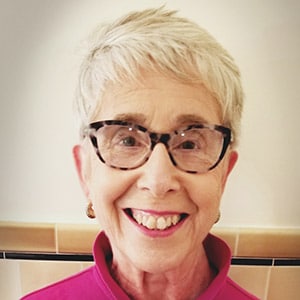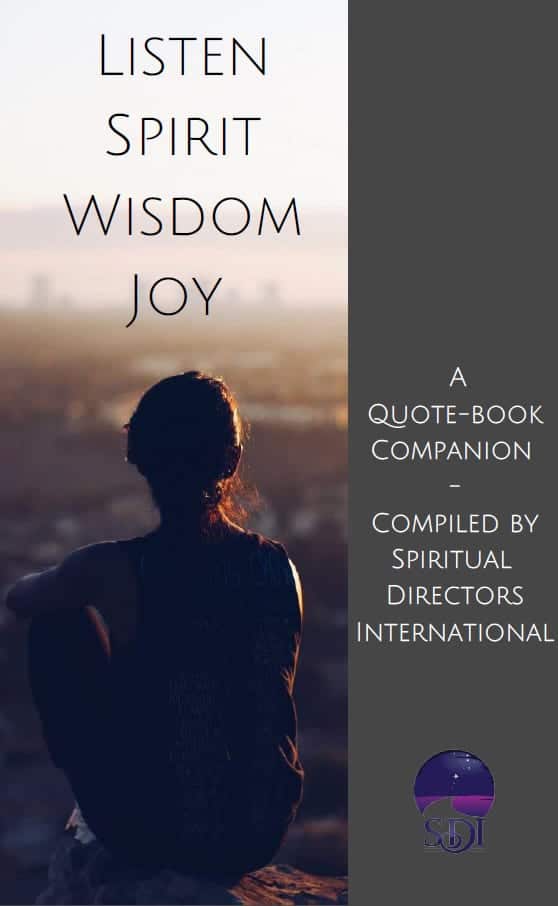This is your chance to ask questions about the practice and process of group spiritual direction and get answers from respected author and spiritual director Dr. Roslyn “Roz” G. Weiner.
SDI Press published Roslyn’s book Seeking in the Company of Others: The Wisdom of Group Spiritual Direction in late 2021. Soon afterward, Roz led an SDI webinar series about GSD.
The response to both the book and the webinar series has been lively and the conversation fruitful. So, we thought we would share your good questions and Roz’s wisdom with all the SDI community through this column, which will appear monthly in our SDI Stories section of our website.
Please email us your questions here, and Roz will offer her responses to one or two queries in this column on a monthly basis.
As we continue to explore the wisdom and grace of seeking spiritual guidance in the company of each other, every question has value. Do join the conversation!
Meantime, to get us started, here are some questions Roz has received recently:
By Dr. Roslyn G. Weiner
First a note: I use the word God to talk about infinite, universal, intimate, deep and sacred matters. If readers prefer, I invite them to substitute whatever term of reverence they use for the divine or the deep connection that unites all beings.
How do you formulate questions in GSD? What are you looking for?
As I have faith that God accompanies us as we seek to find sacred meaning in the daily events of our lives, I trust that God is in the room or hovering over the ZOOM screen during a group spiritual direction meeting. While a seeker is speaking, I must listen deeply, edit out my curiosity, and humbly ask whatever question remains in my heart for that person. Like every group member, sometimes I miss the mark and that is okay because I am not perfect and more importantly, the seeker is encouraged to reject any question that is perceived not to be useful.When I notice a question bubbling up in me while a person is speaking, I hold it gently and keep listening; sometimes several questions arise. When the speaker signals completion of thought, I wait a bit (perhaps there is more to say) and then try to notice where in my body my questions originated. I quickly ask myself who might benefit if I ask; if mostly, me, I abandon the question. If the question is either intellectually driven or of a repair quality, it is also not voiced. I seek heart-based questions; those usually resonate with the speaker. Remember—the questions are always meant to serve the speaker, an invitation to go deeper and hopefully discover more.
How would you move a group from an intellectual discussion to a spiritual one?
Often within the mind there is a curiosity or even a hunger to know what the heart has to say about a particular matter. But life experiences often discipline us to be very protective about revealing heart contents. When a group appears to be caught up in head talk, I assume that we have not yet created a sufficient container of trust and safety. Without such a container, it is doubtful that ‘holy boldness’ will manifest.
Gently but firmly, I will observe to the group that I sense that at that moment we are a bit stuck in a headspace. I don’t ever signal out one person or attach my observation to a particular moment in time since every participant shares the responsibility for crafting the sacred container. I ask whether others have noticed what I observe.
Unless the group is within the first few months of existence, others usually concur. What follows is unpredictable but here are some possibilities: spontaneous shift head to heart, conversation about what would open up the sharing or transform it to something deeper, reflections about the unfamiliarity of receiving an invitation to do God-talk with others, direct acknowledgment about discomfort in the setting or the invitation, requests that I tell them what to do.
I invite patience. Sometimes, I introduce a new poem, quote or question—sort of like a reboot. Sometimes, I share my wondering if there is something about our process or how we have set boundaries that has created an impediment. Or, I might express curiosity as to whether anyone would be willing to revisit a previous sharing in a new way. Remember, persons choose to join a small community of seekers and so we can comfortably hope that with time and practice and the growth of trust, the group will find its way.

Dr. Roslyn G. Weiner, PhD, STM is the author of the new book from SDI Press, “Seeking in the Company of Others – The Wisdom of Group Spiritual Direction.” She is a seasoned spiritual director and psychologist, with 18 years of experience facilitating groups in spiritual direction. She earned a PhD in psychology from Yale University and an STM degree from the School of Theology, Boston University. This column will appear monthly in the “SDI Stories” section of the website. If you have questions about group spiritual direction that you’d like to be answered in the column, please send them here.




